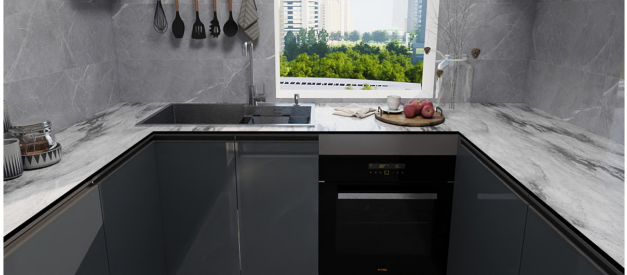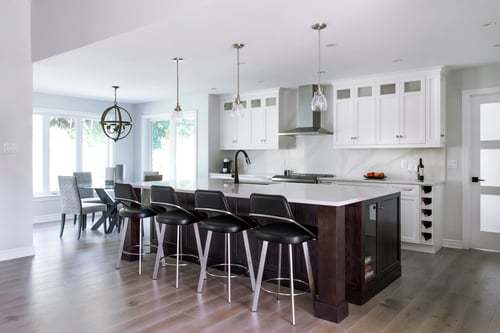Choosing the right countertop material can significantly impact the aesthetics, functionality, and value of your kitchen or bathroom. Two popular options are compact laminate and stone countertops, each with its own set of advantages and considerations. This article will guide you through the key differences, benefits, and best use cases for compact laminate and stone countertops to help you make an informed decision.
Understanding Countertop Materials
Compact Laminate Countertops
Composition and Properties
Compact laminate countertops are made from multiple layers of kraft paper impregnated with resin, compressed under high pressure and temperature to form a solid, durable surface. They are often used in environments that demand high durability and resistance to moisture and heat.
Key Properties
Affordability: Generally more affordable than natural stone options.
Durability: Highly resistant to scratches, heat, and moisture.
Design Variety: Available in various colors and patterns.

Stone Countertops
Types and Properties
Stone countertops include a variety of natural and engineered materials, such as granite, marble, quartz, and soapstone. Each type has unique characteristics and benefits.
Granite: Known for its durability and resistance to heat and scratches.
Marble: Offers a luxurious appearance with unique veining patterns.
Quartz: Engineered stone that is non-porous and highly durable.
Soapstone: Heat-resistant and develops a beautiful patina over time.
Advantages of Compact Laminate Countertops
Cost-Effective
Compact laminate countertops are generally more affordable than natural stone options. They provide a cost-effective solution for those looking to renovate their kitchen or bathroom on a budget.
Durability
Compact laminate is incredibly durable, with high resistance to scratches, impact, moisture, and heat. This makes it suitable for busy kitchens and bathrooms.
Wide Range of Designs
Compact laminate offers an extensive variety of colors, patterns, and textures. This versatility allows homeowners to achieve the look they desire, whether it's a sleek modern finish or a classic woodgrain appearance.
Easy Maintenance
Compact laminate countertops are easy to clean and maintain. They resist stains and do not require sealing, making them a low-maintenance option for busy households.
Advantages of Stone Countertops
Durability
Stone countertops, especially granite and quartz, are incredibly durable. They can withstand heavy use, resist scratches and heat, and last for many years with proper care.
Aesthetic Appeal
Natural stone countertops offer a timeless and elegant look. Each slab of stone is unique, providing a one-of-a-kind aesthetic that adds value and beauty to any space.
Increased Home Value
Investing in stone countertops can increase the resale value of your home. Potential buyers often see stone countertops as a premium feature, making your property more attractive on the market.
Heat and Scratch Resistance
Granite and quartz countertops are highly resistant to heat and scratches, making them ideal for kitchens where hot pots and sharp knives are frequently used.

Considerations When Choosing Countertops
Budget
Compact laminate countertops are a more budget-friendly option, while stone countertops require a higher upfront investment. Consider your budget constraints when making your decision.
Maintenance Requirements
Compact laminate countertops require minimal maintenance, while stone countertops, particularly marble and granite, may need periodic sealing to protect against stains and damage.
Aesthetic Preferences
Think about the overall look you want to achieve. Compact laminate offers a wide range of designs, while stone provides a natural, luxurious appearance that cannot be replicated by synthetic materials.
Durability Needs
Consider how much wear and tear your countertops will endure. If you have a busy kitchen with heavy usage, stone countertops may be the better choice for their durability and resistance to damage.
Best Use Cases for Compact Laminate Countertops
Rental Properties
For rental properties, compact laminate countertops offer a cost-effective and attractive solution that is easy to replace if damaged by tenants.
Budget Renovations
Homeowners looking to renovate on a budget can achieve a stylish and updated look with compact laminate countertops without breaking the bank.
Commercial Spaces
Compact laminate is ideal for commercial spaces such as offices, restaurants, and retail environments due to its durability and ease of maintenance.
Best Use Cases for Stone Countertops
High-End Kitchens
For high-end kitchen renovations, stone countertops provide a luxurious and durable surface that can withstand heavy cooking and entertaining.
Bathrooms
Stone countertops, particularly marble, add a touch of elegance to bathrooms and are resistant to moisture and heat from hair styling tools.
Outdoor Kitchens
Granite and other durable stones are ideal for outdoor kitchens as they can withstand the elements and provide a sturdy, attractive surface for outdoor cooking and dining.
Installation and Maintenance
Compact Laminate Countertops Installation
DIY Installation
Compact laminate countertops are suitable for DIY installation. With the right tools and measurements, homeowners can install these countertops themselves, saving on labor costs.
Professional Installation
For those who prefer professional installation, the cost is still lower than that of stone countertops, making it an affordable option even with labor included.
Stone Countertops Installation
Professional Installation
Stone countertops require professional installation due to their weight and the precision needed for cutting and fitting. This ensures a perfect fit and minimizes the risk of damage.
Maintenance Tips
Sealing: Granite and marble countertops should be sealed periodically to protect against stains.
Cleaning: Use mild, non-abrasive cleaners to maintain the surface and avoid harsh chemicals that can damage the stone.
Avoiding Damage: Use cutting boards and trivets to prevent scratches and heat damage.
Conclusion
Choosing between compact laminate and stone countertops depends on your budget, aesthetic preferences, maintenance expectations, and durability needs. Compact laminate countertops offer a cost-effective, versatile, and easy-to-maintain option, making them ideal for budget-conscious renovations and rental properties. Stone countertops, on the other hand, provide unparalleled durability, aesthetic appeal, and added home value, making them a worthy investment for high-end kitchens and bathrooms.
By carefully considering the pros and cons of each material, you can select the countertop that best suits your needs and enhances the overall look and functionality of your space.
English
Русский
العربية
Français
Español
Português
Deutsch
italiano
日本語
한국어
Nederlands
Tiếng Việt
ไทย
Polski
Türkçe
አማርኛ
Bahasa Melayu
தமிழ்
Filipino
Bahasa Indonesia
magyar
Română
Монгол
қазақ
Српски
हिन्दी
فارسی
Kiswahili
Slovenčina
Slovenščina
Svenska
українська
Ελληνικά
Suomi
Հայերեն
עברית
اردو
Shqip
বাংলা
Hrvatski
Afrikaans
Māori
සිංහල
Oʻzbekcha
latviešu
Беларуская мова
Bosanski
Български
ქართული
Lietuvių
Malti
Runasimi




